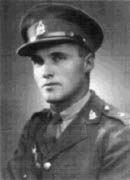
Brigadier Harry H. Angle
(Photo and text were
provided by Peaceful Schools International, Nova Scotia,
Canada)
Brigadier Harry H. Angle, DSO died on 17th July 1950 when the plane he was travelling on crashed in the mountains
of Punjab-Kashmir region. He had been acting as the Chief Military Observer for the United Nations Commission
for Kashmir, and was the first Canadian peacekeeper to be killed whilst on a UN peacekeeping mission.
He was also the first Chief Military Observer in the region and helped to establish a UN control headquarters
in Srinagar, India, and then in Rawalpindi, Pakistan. Angle had previously been serving as an observer supervising
the truce between India and Pakistan in Kashmir since the beginning of 1949.
A statement given by the United Nations Secretary General Trygve Lie, concerning the tragedy, recognized and praised
'the high quality of their work, and their devotion to duty' stating that 'their spirit of cooperation will
long be remembered in the annals of the United Nations.'
During the Second World War, Brigadier Angle had been in command of the British Columbia Dragoons of the 5th
Canadian Armoured Division in Italy, and was later general officer (1st grade) at the division's headquarters.
After the war he returned to Canada with the B.C. Dragoons and remained as its commander when the regiment was
converted into a reserve unit. When he retired from active military life, Angle returned to fruit ranching
and became a magistrate in Kelowna B.C.
United Nations Bulletin
August 1, 1950
Air Crash Kills Four
on India and Pakistan Representative's Staff
Four members on the staff of Sir Own Dixon, United Nations Representative in India and Pakistan, were killed
in a airplane crash on July 17, on a flight between New Delhi and Srinagar, Capital of Kashmir.
Among the victims were Sandford Major, Communications Officer with Sir Owen; Brigadier H.H. Angle of Canada,
formerly Chief Military Observer for the Commission for India and Pakistan; and two United States military
observers, Lieut.-Col. Mayfield and Col. Brown.
Mar. Major, who was 36 years old, joined the Secretariat
in October 1946. He served with the United Nations Palestine Commission as a communications officer and volunteered
to help organize and maintain United Nations communications in Kashmir.
Brigadier Angle, who was 43, formerly commanded the Ninth Armored Regiment of the Fifth Canadian Armored
Division. He led his regiment in Italy and northwest Europe during the Second World War. He retired to the
Supplementary Reserve of the Canadian Army in 1947 and was appointed Chief Military Observer to the Commission
in January 1950.
In a statement following the tragedy, Secretary-General
Trygve Lie said he was deeply grieved. "All these United Nations Officers," he continued, "have
had a most excellent record while serving the cause of the United Nations in India and Pakistan.
"The high quality of their work, their devotion to duty, their spirit of co-operation will long be remembered
in the annals of the United Nations," he stated. The Secretary-General also expressed his sympathy to
the Government of India for the death of Indian officials on the plane.
|